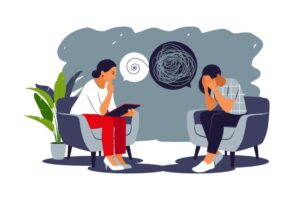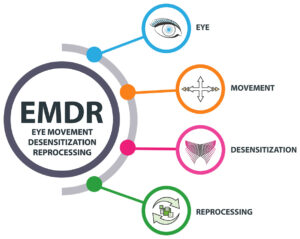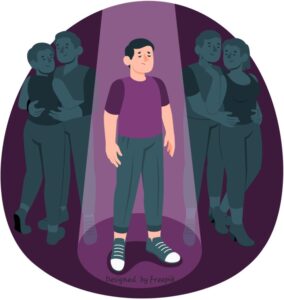Obsessive-compulsive disorder or OCD is a mental illness that consists of a pattern of unwanted thoughts and sensations (obsessions) that lead a person to perform repetitive behaviors (compulsions). In simpler terms it’s an unprompted urge to consistently think about certain thoughts and repeatedly do certain actions; for example, if a person is obsessed with cleanliness they might clean their surroundings and themselves more times than required and still be thinking about cleaning. These obsessions and compulsions can significantly interfere with one’s daily activities and cause significant major distress.
One may consciously try to ignore or control your obsessions, but that only results in increased distress and anxiety. And ultimately, the same person would be strongly driven to perform compulsive acts in order to ease their stress. Despite all efforts to ignore or get rid of these obsessive thoughts and compulsive urges, they keep coming back. In the end, it leads to more ritualistic and rigid behavior patterns. The vicious cycle of OCD is hard to break free from.
The obsessive and compulsive thoughts and urges very often center around a certain fear and themes — for example, a non-negotiable need to have things in order or symmetry. To fulfill these needs, they may compulsively always set things in a certain way and in a specific angle and get significantly distressed if those things are out of place.
Types of OCD:
OCD varies from individual to individual but most cases are often categorized into the following four general categories:
- Checking and rechecking of things such as locks, alarm systems, ovens and burners, plug points or light switches, or consistently thinking you have some kind of a medical condition.
- Contamination, a deep-rooted fear that things around them might be dirty or contaminated in a certain way; this leads to a strong compulsion to constantly clean. Mental contamination is also part of this, it involves a strong constant feeling that you’ve been treated like dirt.
- Symmetry and order, an unexplainable need to have things lined up or kept in a certain way at a certain angle.
- Ruminations and intrusive thoughts are an obsession with a single line or train of thought. Some of these intrusive- obsessive thoughts might be violent or disturbing.
Symptoms of OCD:
Obsessive-compulsive disorder (OCD) more often than not includes the symptoms for both obsessions and compulsions. But it’s also a possibility to have symptoms for either one of them. One may or may not realize that their obsessions and compulsions are excessive or unreasonable in any way, but these urges and obsessions take up a great deal of their time and disrupt their daily routine and social functioning. They might not want to do or think those things but are powerless to them.
Symptoms of Obsession:
Obsessions is intrusion of repeated, persistent and unwanted thoughts, it’s the urges or images that are hard to jerk off and cause immense distress or anxiety in the individual. One might consciously or unconsciously try to ignore them or get rid of them by performing a series of compulsive behavior or ritual. These obsessions often interfere with your lifestyle as they won’t let you think of or do other things.
Obsessions are often based around certain themes, such as:
- Fear of contamination is an obsessive and unexplainable thought of things around them and themselves being dirty.
- Doubting and having difficulty tolerating any kind of uncertainty. These people are very uncomfortable with the idea of change.
- Symmetry and Order are a persistent want for every single thing to be orderly and symmetrical.
- Violent and Aggressive thoughts are horrific intrusive thoughts about losing control and harming yourself or others
- Unwanted thoughts and persistent thoughts, including aggression, or sexual or religious subjects that are impossible to jerk off.
Certain Examples of obsessive signs and symptoms:
- A constant fear of being contaminated by touching objects others have touched and eventually avoiding those spaces.
- Intense stress and anxiety when objects anywhere in the environment aren’t orderly or facing a certain way
- Persistent images of driving your car into a crowd of people and unwanted constant thoughts about shouting obscenities or acting inappropriately in public
- Avoidance of situations, social or otherwise that may trigger their obsessions.
Compulsion symptoms:
Compulsions are repetitive behaviors for which you feel an unavoidable urge to perform. These repetitive physical or mental acts are meant to reduce the anxiety that stems from your obsessions or reduce the fear of something bad happening if that task isn’t performed. However, engaging in these compulsions brings no pleasure and may offer only a temporary amount of relief from the anxiety that’s driving these acts.
One may make innumerable rules or rituals to follow thinking that it would help control or reduce your anxiety when you’re having obsessive thoughts. These compulsions are excessive and are usually unrelated to the problem they’re intending to fix.
Similar to obsessions, compulsions are also typically themed and stem from unrealistic fears, such as:
- Repetitive washing and cleaning of things in fear of contamination
- Constant and untimely checking of things like locks, oven, or medical assessments.
- Repetitive Counting of things or in certain patterns
- Arranging and Rearranging things to maintain their preferred way of orderliness.
- Following a strict routine and keeping things in a peaceful monotony in fear of change and losing control.
Certain examples of compulsive symptoms include:
- Hand-washing or bathing till your skin becomes raw or damaged.
- Untimely and repetitive checking doors, locks, and alarm systems repeatedly to make sure they’re secured.
- Counting in certain patterns or silently repeating a prayer, word or phrase constantly
Treatments for OCD:
OCD is an itch in the brain that doesn’t go away on its own and has no sure shot cure. You can’t control or wish away the repetitive thoughts and behaviors that control your life. But you can get proper treatment for it by seeking out a professional to help you.
But before you go and see a psychologist, you must meet up with your physician in order to confirm that your symptoms don’t stem from an underlying physical illness. If they’re not, your doctor will recommend you to a mental illness specialist, like a psychologist or psychiatrist.
OCD can be treated with therapy and in certain cases medication. For many combining both of these works best.
- The most sought-after treatment is Psychotherapy especially in form of Cognitive behavioral therapy (CBT). CBT is a type of psychotherapy that gives you the tools to think, act, and react to your unhealthy thoughts and habits. As OCD has a cycle: obsessions, anxiety, compulsions, and relief. CBT is considered most effective to deal with this illness as it strives to replace negative thoughts with productive ones.
- Exposure and response prevention (ERP), is a specific form of CBT. In this, you’re exposed to the things that trigger your anxiety, in little doses. And eventually, you learn new ways to respond to your anxiety instead of performing your repetitive rituals
- Medication is another way to go about this and a few kinds of antidepressants are often the first medications prescribed for OCD. Doctors may prescribe have you try clomipramine (Anafranil), fluoxetine (Prozac), fluvoxamine (Luvox), sertraline (Zoloft), or another antidepressant, depending on your age, health, chronic diseases, and symptoms.
- It can take the drugs some time to have a proper effect and might have harmless side effects like dry mouth, nausea, or harmful ones like thoughts of suicide. Contact your doctor immediately right away if you have any thoughts about killing yourself.
Treatment goals for OCD are to retrain your brain in order to control your symptoms with the least amount of medication possible. On a personal level, you can help and assist your treatment by eating healthy food, exercising, and getting enough sleep. Emotional support also plays a crucial role in the effectiveness of the treatment. Make sure you surround yourself with encouraging family, friends, and people who understand OCD.
Feel free to reach out to us for counseling and psychotherapy sessions from our trained psychologists, and psychotherapists.




